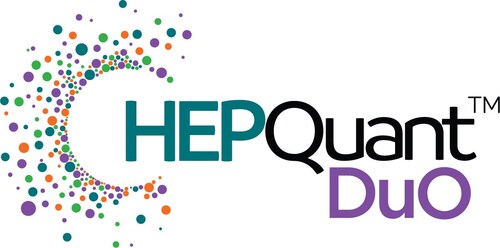HepQuant, a leader in developing noninvasive, blood-based, quantitative testing to assess liver health, presented promising data utilizing the HepQuant DuO™ test to quantify liver function and physiology at an oral presentation on September 30, 2025 during the 9th Annual MASH Drug Development Summit in Boston, MA. Dr. Gregory T. Everson shared exciting data on the use of the HepQuant DuO test as a reasonably likely surrogate endpoint for clinical trials, highlighting this valuable tool in evaluating patients and planning studies.
DENVER, Oct. 2, 2025 /PRNewswire-PRWeb/ -- HepQuant, a leader in developing noninvasive, blood-based, quantitative testing to assess liver health, presented promising data utilizing the HepQuant DuO™ test to quantify liver function and physiology at an oral presentation on September 30, 2025 during the 9th Annual MASH Drug Development Summit in Boston, MA. Dr. Gregory T. Everson shared exciting data on the use of the HepQuant DuO test as a reasonably likely surrogate endpoint for clinical trials, highlighting this valuable tool in evaluating patients and planning studies. HepQuant also presented a conference abstract and poster with key findings demonstrating how the HepQuant DuO test uncovered functional heterogeneity of compensated advanced chronic liver disease (cACLD) in real world clinical practice. HepQuant DuO test results, including Disease Severity Index (DSI), SHUNT%, and Risk for Adverse Clinical Events (RISK ACE), may be used in clinical trials and have demonstrated value in routine clinical practice to characterize the baseline spectrum of liver health, define and estimate risk for clinical outcomes, and quantify changes in risk to improve subject identification and study design.
The oral presentation titled "HepQuant DuO™ Defines Risk for Clinical Outcome and Quantifies Changes in Risk" highlighted how the test can support:
- Characterization of the baseline spectrum of liver health within a study population: DSI and SHUNT% of quantify liver function and physiology.
- Improved sensitivity of key measurements of portal hypertension: DSI uncovered more endoscopic lesions of hypertension and missed fewer varices compared to standard liver stiffness measurements.
- Reasonably likely surrogate endpoints for monitoring response to treatment or interventions: Baseline and real-time measurement of liver function and portal-systemic shunting across time in the study population enables effective data capture and analysis.
- Identification of clinical study subjects based on risk of clinical outcome: Baseline estimation of risk to optimize study design may allow for smaller sample size and shorter trial duration.
The poster presentation, titled "The Quantitative HepQuant DuO Test Uncovers the Functional Heterogeneity of Advanced Chronic Liver Disease" focused on providing quantitative functional assessment to inform decisions in the clinic regarding the use of endoscopy to screen for varices, defining the intensity of clinical follow-up, and establishing a baseline for monitoring treatment effects. HepQuant DuO results from patients diagnosed with Metabolic-Associated Steatohepatitis (MASH), Metabolic dysfunction and Alcohol-Related Liver Disease (Met-ALD), ALD and various other liver disease etiologies showed significant heterogeneity in functional and physiological impairment, reinforcing the utility and need for reproducible, quantitative tools to evaluate cACLD.
Dr. Gregory T. Everson, CEO of HepQuant, commented, "The ability to identify treatment responders and track clinical risk reduction provides a significant advancement for liver disease management. These findings underscore the utility of the HepQuant DuO test as a powerful tool for quantifying liver health."
About HepQuant
HepQuant has developed noninvasive, blood-based, quantitative tests that assess liver health by measuring critical liver cell processes and blood flow to the liver. Our test results, in conjunction with other clinical assessments, inform healthcare providers' clinical decisions to achieve more effective management of patients with advanced liver disease. Knowing where a patient falls on the disease spectrum informs personalized treatment decisions for that individual. HepQuant is a privately held diagnostics company based in Denver, Colorado. Learn more at HepQuant.com.
HepQuant DuO is a Laboratory Developed Test (LDT). This test was developed and its performance characteristics determined by HepQuant, LLC in a manner consistent with CLIA requirements. This test has not been cleared or approved by the U.S. Food and Drug Administration
Contact
Joellyn Enos, Chief Commercial Officer [email protected]
303.268.7069
Media Contact
Joellyn Enos, HepQuant, 1 3032687069, [email protected], https://hepquant.com/
SOURCE HepQuant



Share this article